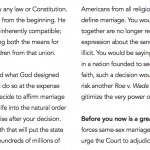In late March The Washington Post published a peculiar ad from the American Family Association (AFA) addressing the U.S. Supreme Court, which will soon issue a ruling on the constitutionality of same-sex marriage bans in a handful of states. The ad, in brief, demands that the Supreme Court uphold these marriage bans or else.
Think of the threatening tone as the AFA’s Hail Mary effort to salvage a victory, a victory seemingly harder to achieve for the AFA and its allies with each passing year. Paying attention to the ad’s threat, rather than focusing on its “smug certainty about marriage,” as one friend phrased it, helps turn our attention to why the AFA is making this threat now.
In short: the threat comes in response to the AFA’s changing place in the cultural landscape and its limited theological resources for dealing with this change.
Quoting from Genesis 1:27 and Matthew 19:5 as proof texts, the ad articulates a particular political theology that includes a precise definition of marriage as:
… neither manmade nor created by any law or Constitution. It was God’s plan and purpose for civilization from the beginning. He created man and woman as distinctly separate but inherently compatible; each unique yet sexually complementary—providing both the means for and the ideal relationship within which to raise children from that union.
For the AFA there is only one possible kind of marriage—and a fundamentally extra-legal one at that (i.e. marriage exists prior to “law or Constitution”). As Mary Ann Case has shown, this kind of singular model of marriage helps explain why many U.S. protestants worry so intensely about the state legalizing same-sex marriage. To change marriage law is, for these protestants, to change marital theology.
So the AFA works to make its theological vision of marriage compelling to the Supreme Court, not only through the much-discussed language of religious freedom, but by appeals to the rhetoric of democracy and, as the ad says, at “the expense of children, perhaps even civilization itself…”
While it isn’t difficult to challenge individual strands in this tangle of incohesive claims, it wouldn’t address the rhetorical force of the AFA’s argument, which is far more emotional or instinctive in nature. Something more profound—and troubling—is going on here beyond simply getting people to feel like children’s wellbeing and people’s religiosity are being trammeled upon.
The AFA, I would argue, understands the law and the courts as an extension of its religious speech. To change the law in ways that don’t conform to the AFA’s religious vision, therefore, is to change the AFA’s speech on its behalf and against its will.
In this context it’s worth considering the synchronized relationship of the U.S. government and the AFA’s version of Christianity as outlined in its philosophical statement [emphasis mine]:
The American Family Association believes that God has communicated absolute truth to mankind, and that all people are subject to the authority of God’s Word at all times. Therefore AFA believes that a culture based on biblical truth best serves the well-being of our nation and our families, in accordance with the vision of our founding documents . . .
In this formula, the founding documents of the U.S. government, including the Constitution, are in perfect harmony with the AFA’s reading of the Bible. If “biblical truth” accords with “the vision of our founding documents,” then violating that truth—by ruling against same-sex marriage bans, for example—must transgress the U.S. Constitution.
The AFA’s position here is an extreme example of H. Richard Niebuhr’s “Christ of culture” typology, about which he wrote: “the mores they associate with Christ have at least as little relation to the New Testament and as much connection with social custom as have those of their opponents [i.e. liberal Christians, also commonly ‘Christ of culture’ types but from a different cultural angle].”
The “Christ of culture” types, moreover, are not about to sit idly by while their vision of society fails to be enforced or realized. And this is where the real threat embedded in the ad emerges.
The AFA dangles what it sees as the Court’s worst fear before the justices. “[Legalizing same-sex marriages nationally] would not only risk another Roe v. Wade tear in our cultural fabric, but also effectively delegitimize the very power of the court itself to rule justly.”
That is, the Court rules justly when it rules in accord with Nature, which, in this case, equals marriage between two opposite sex people as instituted by God prior to human governments.
But in the end I read the AFA’s ad as an act of blustering bravado—as an act of desperation, not of strength. The AFA sees its culture and its Christ coming apart and they don’t know what else to do but desperately try to piece them together again like a sad humpty-dumpty.





